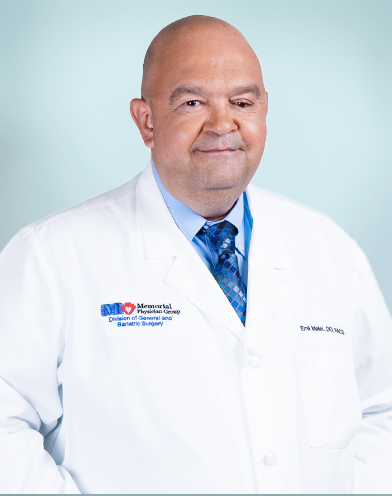Bariatric Surgery Options
Contact us today to take the first step on your weight loss journey.
Call Us: 954-276-1400 Request a consultationTypes of Bariatric Surgery
Each year, our surgeons have performed thousands of minimally invasive bariatric surgery procedures featuring smaller incisions (minimally invasive). We use the latest technology and techniques for effective and safe results with advanced minimally invasive surgery.
When compared to traditional open surgery, the benefits of minimally invasive weight loss surgery include:- Less pain
- Quicker recovery
- Smaller scars
- Very low rate of complications
A sleeve gastrectomy restricts the amount of food that you can eat. During the procedure the surgeon removes about 75 percent of the stomach. What’s left behind is a small sleeve of your stomach in the shape of a banana that holds only a small amount of food. You will eat less and feel full sooner with a smaller stomach.
This surgery also changes your body’s hunger signals. The part of the stomach that the surgeon removes releases a hormone that tells your body you are hungry. When it’s gone you will not feel as hungry, so you will eat less. There are no changes to your small intestine in this type of bariatric procedure.
The Roux-en-Y gastric bypass surgery is one of several gastric bypass procedures available. This is a more aggressive type of bariatric surgery and most people see significant weight loss within 18 months after surgery. You will stay in the hospital for about two nights after the procedure.
To perform this procedure, your surgeon makes your stomach smaller by stapling off an egg-size pouch from the upper stomach. Then the surgeon attaches pouch to directly to your small intestine. With Roux-en-Y you lose weight because:
- You eat less food because of the smaller stomach.
- The food you eat bypasses most of the stomach and top part of the small intestine. Your body absorbs less fat and calories when it travels this shorter digestion route.
Single anastomosis duodenal switch is a modified version of a popular weight loss surgery called a duodenal switch.
Initially, the surgeon performs a sleeve gastrectomy to make your stomach smaller and control hunger signals. Next, they disconnect part of your small bowel (the duodenum). They connect your smaller stomach to your intestines at a spot further down the digestive path. This leaves less time for your body to absorb calories from your food, which helps with weight loss.
We can do this surgery after a sleeve gastrectomy to help you lose more weight. We can also do it as your original weight loss operation.
The adjustable gastric band technique, frequently referred to by the device name Lap Band, changes the size of your stomach. Your surgeon places a small band around the top of your stomach, shrinking its size so it holds less food. Your surgeon can adjust the band later, if necessary, to change the stomach size.
This surgery is beneficial because it:
- Does not involve any cutting or stapling of the stomach or intestines
- Is fully reversible if you want to remove the gastric band later
We were one of the first hospitals to provide intragastric balloon surgeries for weight loss. Our team combines the weight loss balloon with a healthy diet and exercise program.
Important things to know about the procedure:
- We place a soft silicone balloon into your stomach and fill it with saline
- The entire procedure takes about 30 minutes
- Most people can go home the same day
The balloon takes up space in your stomach so you will feel less hungry and eat smaller meals. Six months after placing the balloon, we remove it. You will still meet with a dietitian to continue your healthy lifestyle changes.
Contact us today to take the first step on your weight loss journey.
Call Us: 954-276-1400 Request a consultation
Bariatric Weight-Loss Surgery Program at Memorial
How do I Prepare for Bariatric Surgery
First, you will meet with one of our surgeons to decide which surgery is the best choice for you. The following steps, required by insurance companies, prepare you for your procedure and set you up for success. Before your bariatric surgery:
- You meet with a dietitian to learn about lifestyle changes for healthy diet and exercise. These habits can help you sustain your weight loss after the surgery.
- You attend behavioral counseling with one of our social workers to discuss your weight loss goals and expectations.
- Our team will contact your insurance to get the necessary preauthorization so your surgery is covered.
- We do a medical exam and obesity screening to show that you meet the criteria for weight loss surgery. The criteria vary based on your insurance.
- We will get documentation of prior physician-assisted weight loss attempts if your insurance requires it.
The process to prepare for your surgery can take up to three months. If you are paying for surgery out of pocket (self-pay) this process can be shorter.
Contact us today to take the first step on your weight loss journey.
Call Us: 954-276-1400 Request a consultation
Patient and Family Centered Care
We treat patients and family members as partners in healthcare.









